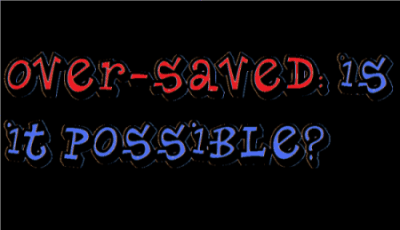[article.] Over-Saved: Is It Possible?
Published on January 14, 2013
 Have you ever tried to have a conversation with someone whose every word revolved around religion? Even an innocuous question like, “Hey, did you see the football game last night?” gets an overreaching answer like, “No, but I talked to the Lord last night!”
Have you ever tried to have a conversation with someone whose every word revolved around religion? Even an innocuous question like, “Hey, did you see the football game last night?” gets an overreaching answer like, “No, but I talked to the Lord last night!”
I recently watched a stand-up routine on YouTube from Michael Jr., one of my favorite Christian comedians, that was pretty funny but also quite interesting. In the same vein of Jeff Foxworthy’s classic “You Might Be a Redneck…” routine, Michael Jr. riffs on folks that he considers “over-saved”. Here are a few examples:
“If a friend buys a vacuum and you rebuke it because it’s a Red Devil, then you might be over-saved.”
“If you save all your documents so they don’t go to hell, then you might be over-saved.”
“If all of your pick-up lines come from Song of Solomon (“Your teeth are like a flock of shorn sheep”), then you might be over-saved.”
The routine is funny, but it brings up a legitimate point. Is it possible to be too saved? Can you have too much God in your life? I guess it really depends on your take on the term “over-saved”. Personally, I believe over-saved is just another way to describe people who are “religious”.
Webster defines the term “religious” as “…relating to or manifesting faithful devotion to an acknowledged ultimate reality or deity”, which doesn’t really sound bad in theory, but in recent years, the term has mutated into a somewhat offensive term among Christians.
For us to truly understand how this happened, we first must recognize that there is a difference between Religion and Christianity, although the world would look at both concepts and disagree. Religion is defined as “a specific fundamental set of beliefs, rules, and practices agreed upon by a number of persons or sects”. Basically, religion means I go to church every Sunday, I do what my pastor tells me to do, I follow all the tenants of the Bible, and by following these rules and regulations, it will get me closer to God and into heaven.
Based on my own personal experiences, the stereotypical religious person has a tendency to be strongly judgmental of other Christians who do not implicitly follow these rules. This same person will also feel an obligation to force these rules on non-believers and will gladly condemn them if they choose otherwise. Unfortunately, due to the insurmountable pressure that stereotypical religious folks put on themselves and others to be “perfect” in the application of these biblical rules and regulations, they tend to struggle with guilt when they fall short.
If you have spent any time in church, you have definitely run into folks like this.
They are stuck in their ways and use the “This is the way we’ve always done it” excuse to keep things the way they have always been. They walk up to the altar call every Sunday for prayer just so they can be seen. They are quick to criticize but slow to take responsibility for their own actions. They see themselves as much closer to God than anyone else. One can see why a Christian would balk at being referred to as religious.
Christianity, on the other hand, includes a lot of the same elements mentioned in Webster’s definition of religion, but it has one element that religion does not cover — Relationship. Religion involves rules and works. Christianity is all about our personal relationship with Christ and like any relationship, it is a growing process. The deeper your relationship with Christ becomes, the more you seek to live like Him as opposed to being driven by guilt. We Christians know that we are imperfect sinners who are saved by grace. We are not set up to fail because Christ already knows that we are works-in-progress. Our job is to strive to be a better Christian every day through a combination of our works, our relationship with Him, and our relationship with our fellow brothers and sisters under God.
In Colossians 2:16-17, the scripture says, “Therefore do not let anyone judge you by what you eat or drink, or with regard to a religious festival, or New Moon celebration or a Sabbath day. These are a shadow of the things that were to come; the reality, however, is found in Christ.” We can’t get caught up in traditions, rules, and rituals. I buy flowers for my wife not because I have to or because it is expected, but because of my relationship with her. I want to do things for her because I love her.
The same scenario applies to how we live for Jesus. We adhere to His teachings because we love Him. Because we love Him, we will want to follow His path. If we follow his path, our actions and works will reflect the type of life that He lived and, ultimately, the type of life we want to live. If we try to please God through religion alone, we will become discouraged and bitter.
With that being said, I go back to my original question: Is there such a thing as too much God in your life?
My answer to that is absolutely not. However, it is possible for us to put too much emphasis on rules and tenants instead of a true relationship with Him. At the same time, we should not profess to have a relationship with God and not have any works or actions of faith to show for it. The Bible makes that clear in 1 John 2:4: “Whoever says, “I know him,” but does not do what he commands is a liar and the truth is not in that person.” Like anything in life, it takes a balanced approach.
We have to be careful not to become so religious that we repel the very people we are supposed to help. It is not the rules and regulations that will get the non-believer to see Christ the way we see Him. It is the unconditional love of Jesus that will be the biggest motivator.


No Comment.